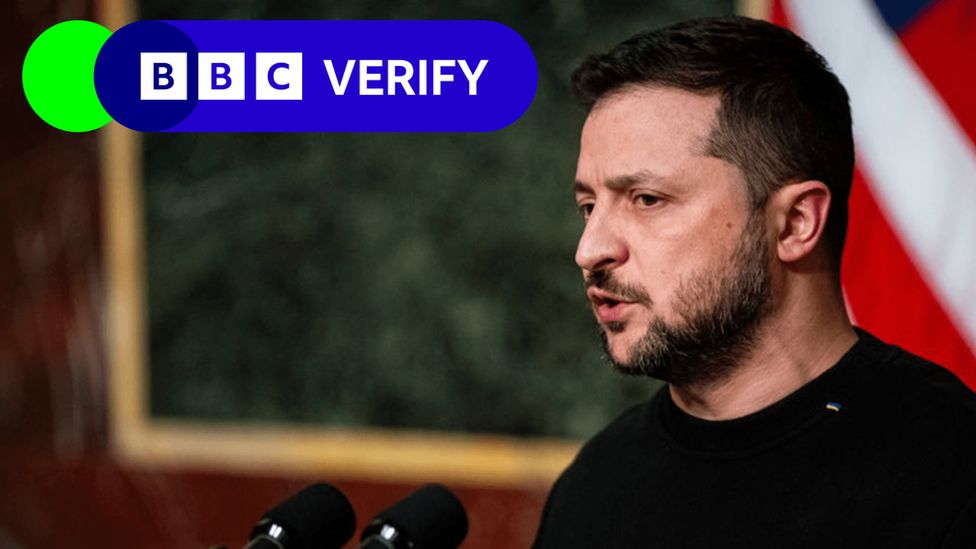ARTICLE AD BOX
 Image source, Getty Images
Image source, Getty Images
By Olga Robinson, Shayan Sardarizadeh and Mike Wendling
BBC Verify and BBC News
A website founded by a former US Marine who now lives in Russia has fuelled a rumour that Volodymyr Zelensky purchased two luxury yachts with American aid money.
Despite the false claim, the disinformation plot was successful. It took off online and was echoed by members of the US Congress making crucial decisions about military spending.
It was an incredible assertion - using two advisers as proxies, Mr Zelensky paid $75m (£59m) for two yachts.
But not only has the Ukrainian government flatly denied the story, the two ships in question have not even been sold.
Despite being false, the story reached members of the US Congress, where leaders say any decision on further aid to Ukraine will be delayed until next year.
Some are vehemently opposed to further support.
On X, formerly Twitter, Republican Congresswoman Marjorie Taylor Greene said: "Anyone who votes to fund Ukraine is funding the most corrupt money scheme of any foreign war in our country's history."
She linked to a story containing the yacht rumour.
Tom Tillis, a Republican Senator and a supporter of military aid to Ukraine, spoke to CNN shortly after senators held a closed-door meeting with Mr Zelensky last week.
"I think the notion of corruption came up because some have said we can't do it, because people will buy yachts with the money," Mr Tillis said. "[Mr Zelensky] disabused people of those notions."
Mr Tillis has butted heads with another Republican Senator, J D Vance, who has also mentioned Mr Zelensky and ships in the same breath.
While discussing budget priorities on a podcast hosted by former Donald Trump adviser Steve Bannon, Mr Vance said: "There are people who would cut Social Security, throw our grandparents into poverty, why? So that one of Zelensky's ministers can buy a bigger yacht?"
Although the yacht rumour is false, the BBC has discovered the story was given a major boost by a Russia-linked website that pretends to be located in Washington.
It is, researchers say, a "likely purpose-built tool for narrative laundering with links to the Russian government".
The 'Washington' website with roots in Russia
The story first emerged in late November on an obscure YouTube channel - one with only a handful of followers and just a single video in its feed.
The next day, it was picked up by a site called DC Weekly, alongside pictures of the two yachts - called Lucky Me and My Legacy - and documents purportedly confirming the sale of the boats to Zelensky's associates.
But the luxury yacht brokers where both vessels are listed for sale said that the allegations are false. The sales documents appear to be forgeries. And instead of having been purchased by Zelensky or his close advisers, both Lucky Me and My Legacy are still up for sale.
Image source, Behnemar
Image caption,The Lucky Me is still up for sale
The DC Weekly story touched off a blaze of online speculation, with multiple sources linking to the story and content citing the story across multiple platforms.
However, the site is not, as the name implies, a weekly publication - nor is it based in the US capital.
Research by Darren Linvill and Patrick Warren, disinformation researchers at Clemson University, shows that DC Weekly was started by John Mark Dougan, a former US Marine and Florida police officer who moved to Russia in 2016.
Mr Dougan spent three years as a deputy with the Palm Beach County Sheriff's office, then after he left in 2009 he started a website spreading rumours about his former employers.
Since moving to Russia he has reinvented himself as a journalist covering the invasion of Ukraine, and has spread a number of false and baseless claims - for example that Russia was attempting to destroy biological weapons labs.
DC Weekly, the Clemson researchers discovered, is full of news stories copied from other sites and rewritten by artificial intelligence engines. The site's "reporters" have fake names along with headshots copied from elsewhere on the internet.
Mixed in with the rewritten stories - apparently designed to give the site a sheen of legitimacy - are dubious original reports.
One such story was the origin of the yacht claim, and the Clemson researchers tracked how the story spread widely after DC Weekly published its version.
Evidence collected by the researchers indicates that the site continued to be connected to the same server as several of Mr Dougan's other websites. BBC Verify also found that part of the DC Weekly website is hosted on a server in Moscow.
Earlier this year Mr Dougan was identified as being a DC Weekly commentator when he gave several talks at an academy affiliated with the Russian Foreign Ministry.
"It is pretty obvious to me that Dougan has been involved with DC Weekly for a long time, and remains connected to the infrastructure behind it," Mr Warren said.
Mr Dougan said via text message that he "emphatically denies these assertions", and that he sold DC Weekly for $3,000 several years ago. He said he does not recall the person he sold it to and has lost the paperwork due to being kicked off payment platforms and losing access to email accounts because of financial sanctions against Russia. He says he has nothing to do with the site's current operations.
The researchers say the site is part of a much larger pro-Russia propaganda machine.
"Whether this one particular guy is behind it doesn't really matter much," Mr Warren said. "The key point is that it is an important element in a very substantial and effective pro-Russian influence operation that needs to be exposed and understood."
The Ukrainian President's Office said of the DC Weekly story: "All information in this article is fake. Zelensky and his family members do not and did not have any yachts."
Mr Tillis and Ms Greene were contacted for comment.
A spokesperson for Mr Vance said: "For years, everyone in the West recognised that Ukraine was one of the most corrupt countries in the world. Somehow everyone forgot that just as we started sending them billions of dollars in foreign aid."
Costume jewellery
The yacht story piles fictional stories onto existing concerns about corruption, which has been a long-running problem in Ukraine. Tackling it is one of the tests the country would have to pass to join Western institutions like the European Union.
According to Transparency International's Corruption Perceptions Index, Ukraine ranks 116th out of 180 countries, although efforts in recent years have seen its position significantly improve.
But the attention given to the country's real and ongoing corruption issues has been mild compared to online chatter over false stories backed up by fake documents and shadowy social media accounts.
In October, a widely shared claim on social media stated that President Zelensky's wife spent a fortune on jewellery in New York while the Ukrainian president was in the city speaking to the United Nations.
Image source, YOUTUBE
Image caption,The woman claimed Mrs Zelenska got her fired, before brandishing a fake $1.1m receipt
Like the yacht rumour, this claim originated on a YouTube channel with very few followers and just one video. The video featured a woman who said she is from Benin. She claimed to work at Cartier on New York's Fifth Avenue.
The woman showed a receipt dated 22 September, with Mrs Zelensky's name on it and a bill for $1.1m for a bracelet, earrings and a necklace.
Facial recognition tools threw up a close match between the woman in the video and photos from social media profiles of a woman who lives in St Petersburg, Russia. When we looked at the pictures of the woman it appeared to be the same person as the one in the YouTube video.
The story went viral on Facebook, TikTok and Telegram. Russia's UK embassy X account shared it with the comment: "Best use of UK taxpayers money ever".
But the receipt is a clear fake. By 21 September, Mr and Mrs Zelensky had left New York and travelled to Canada.
One English-language site was instrumental in spreading the rumour - DC Weekly.
Image source, @ZelenskyyUa
Image caption,President Zelensky and Olena Zelenska arrived in Canada on 21 September
BBC Verify and the Clemson researchers found a number of DC Weekly articles posted between August and December this year that followed the same pattern.
The articles falsely alleged that Prince Andrew made a secret visit to Ukraine, that Ukraine provided weapons to Hamas, that an American non-profit organisation harvested organs in Ukraine and that Zelensky's administration allowed Western companies to use Ukrainian farmland for disposal of toxic waste.
Stories on DC Weekly were often published within days after allegations first appeared on YouTube.
In addition to DC Weekly, some of the allegations - including those about Cartier jewellery and yachts - also appeared on several pro-Kremlin English-language websites as well as legitimate news websites in Africa that accept "sponsored" (paid-for) content.
Some of the stories were picked up by other outlets and accounts. But with the story about the yachts, the people behind DC Weekly appear to have achieved a level of success that had previously eluded them - their allegations being repeated by some of the most powerful people in the US Congress.
Additional reporting by Paul Myers

 1 year ago
45
1 year ago
45








 English (US) ·
English (US) ·